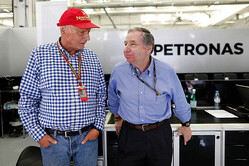


25/11/2014
NEWS STORY
 Ahead of the latest meeting of the sport's Strategy Group, FIA president Jean Todt says he is determined to bring down the cost of engines.
Ahead of the latest meeting of the sport's Strategy Group, FIA president Jean Todt says he is determined to bring down the cost of engines.
With Marussia already appearing to have gone to the wall and administrators doing all they can to save Caterham, attention turns to the sport's three smallest teams - Sauber, Force India and Lotus - who recently called on the sport to address the issue of engine costs.
In an open letter, sent ahead of the season finale in Abu Dhabi, Force India deputy principal Bob Fernley wrote: "The costs of the power unit together with the installation costs amount, on average, to $43m. This clearly shows that 70-80 percent of the FOM income has to be allocated to the engine.
“For us, as engine customers, the engine technology, i.e V6 or V8 turbo-charged or hybrid, is of much less significance, as opposed to engine manufacturers, who are using Formula One as a marketing tool to showcase high-end technology.
"Unlike manufacturer-owned teams, our core business is Formula One," he added. "Yet, we have no choice but to spend most of our income on the engine, and the remaining 30 percent is by far not enough to construct, enter and run a team over a 20-race season.
This was followed by stinging attack from Tony Purnell, the FIA's former technical adviser, who criticised the sport's governing body for failing to cap the cost of the new V6 engines.
The price of the engines was due to be limited to £5m in 2010 under plans developed by F1's teams association and the FIA. However, this fell by the wayside when the FIA attempted to introduce a £40m cap on team budgets. It was eventually dropped after eight of the teams threatened to leave the sport though, ironically, it would have kept their wheels turning now.
The cap was the brainchild of Max Mosley and Purnell who says: "We were probably too ambitious. You can do it policy by policy and one policy would be to set the sale price of these new engines. It's a very small move, and people wouldn't really notice it, but it would be hugely important. Without doubt the engine bill used to be one of the biggest headaches for any small team and I'm sure it still is. It's a massive wedge of money. To me it is crystal clear that it is the FIA's job to do it."
Ahead of the meeting of the Strategy Group, Todt said he determined to find a solution.
"I am going to fight about the price of the engines for the small teams," he said, according to Reuters. "I will do the best. I cannot guarantee the result but I will really get into that.
"On engines I think we can find a solution. I am optimistic we will get something," he added
Insisting that sport's priorities are to reduce costs, improve 'the show', make powertrains cheaper for private teams and to ensure all parties remain in the sport, he said: "We are going to re-present to the different stakeholders through the strategy group the same proposals which were refused. But do they want a cost cap? Do they want to follow the proposals we have to reduce the costs?"
Indeed, speaking in Abu Dhabi at the weekend, Christian Horner suggested the introduction of a new engine for 2016, which would surely drive up costs.
"The costs are too high and I think one of the crucial aspects in those costs is the power unit and that's something the strategy group, as well as the other players within Formula One have a duty of care to look at very carefully and I think, whilst probably not a lot can be done for 2015, I think an awful lot can be done for 2016 and maybe we need to even go as far as looking at a different engine, y'know, a new engine," he said. "Maybe still a V6 but maybe a more simplified V6 that controls the cost. Cost of development, cost of supply to a team and to the privateer teams. I think that's something we need to have a serious discussion about during the next strategy group.
"The engines that we have today are incredible bits of machinery," he added, "incredible bits of engineering but the cost to the collective manufacturers has probably been close to a billion euros in developing these engines, and then the burden of costs has been passed on, unfortunately, to the customer teams so unfortunately, I think we have to recognise what's been done from an engineering point of view and now look to simplify things, potentially retaining the V6 philosophy, perhaps going to a twin turbo that would address the sound issues that we've had this year and maybe even a standard energy recovery system would dramatically reduce the costs, dramatically reduce development and therefore the supply price to the customer teams also. So I think that's something that the strategy group need to discuss and look at."